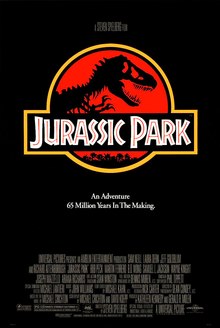Jurassic Park (film)
| Jurassic Park | |
|---|---|

Theatrical release poster
| |
| Directed by | Steven Spielberg |
| Produced by | |
| Screenplay by | |
| Based on | Jurassic Park by Michael Crichton |
| Starring | |
| Music by | John Williams |
| Cinematography | Dean Cundey |
| Edited by | Michael Kahn |
Production
company | |
| Distributed by | Universal Pictures |
Release dates
|
|
Running time
| 127 minutes |
| Country | United States |
| Language | English |
| Budget | $63 million [1] |
| Box office | $1,029,939,903[1] [2] |
Jurassic Park is a 1993 American science fiction adventure film directed by Steven Spielberg. It is the first installment of the Jurassic Park franchise. It is based on the 1990 novel of the same name by Michael Crichton, with a screenplay written by Crichton and David Koepp. The film centers on the fictional Isla Nublar, an islet located off Central America's Pacific Coast, near Costa Rica, where a billionaire philanthropist and a small team of genetic scientists have created awildlife park of cloned dinosaurs.
Before Crichton's novel was published, four studios put in bids for the film rights. With the backing of Universal Studios, Spielberg acquired the rights for $1.5 million before publication in 1990; Crichton was hired for an additional $500,000 to adapt the novel for the screen. David Koepp wrote the final draft, which left out much of the novel's exposition and violence and made numerous changes to the characters. Filming took place in California and Hawaii between August and November 1992, and post-production rolled until May 1993, supervised by Spielberg in Poland as he filmedSchindler's List . The dinosaurs were created with groundbreaking computer-generated imagery by Industrial Light & Magic and with life-sized animatronic dinosaurs built by Stan Winston's team. To showcase the film's sound design, which included a mixture of various animal noises for the dinosaur roars, Spielberg invested in the creation of DTS, a company specializing in digital surround sound formats.
Following an extensive $65 million marketing campaign, which included licensing deals with 100 companies, Jurassic Park grossed over $900 million worldwide in its original theatrical run. It surpassed Spielberg's 1982 film E.T. the Extra-Terrestrial to become the highest-grossing film until Titanic (1997). Jurassic Park was well received by critics, who praised its special effects and Spielberg's direction but criticized the script. The film won more than 20 awards (including 3 Academy Awards), mostly for its visual effects. Following a re-release in 2011, which made $786,021, and again in 2013 in 3D to celebrate its 20th anniversary, Jurassic Park became the 17th film with total grosses of more than $1 billion. It is the 14th-highest-grossing film worldwide, the 16th-highest-grossing film in North America(unadjusted for inflation), and the highest-grossing film released by Universal and directed by Spielberg. Jurassic Parkis considered by many to be one of the greatest films of the 1990s and in some cases of all time, as well as a landmark in the vector of visual effects regarding its computer-generated imagery and animatronics.
Jurassic Park was followed by two sequels, The Lost World: Jurassic Park and Jurassic Park III, both of which were box office successes but received mixed critical responses. A third sequel, Jurassic World, is set for release on June 12, 2015.
0 comments:
Post a Comment